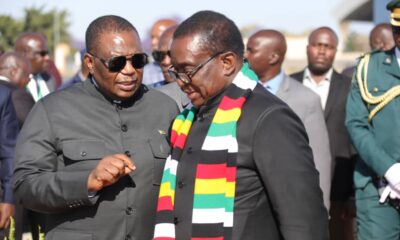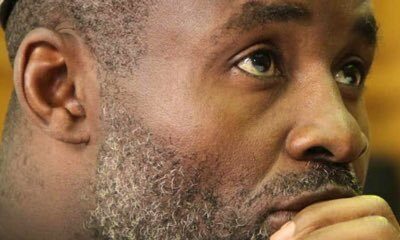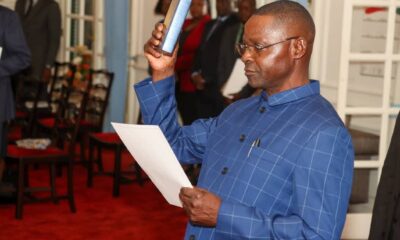PRESIDENT Emmerson Mnangagwa’s political and business cronies, including his new associate Eddie Cross, are behind the new US$1.3 billion megabucks petroleum products pipeline project – whose cost has quickened from US$850 million to US$1.3 billion, and will ultimately surge to US$4 billion, fronted by South African businessman Errol Gregor.
NYASHA CHINGONO
The massive yet shady project has many shades of grey, transparency and accountability gaps and raises eyebrows at many levels.
Investigations by The NewsHawks, which covered Zimbabwe, South Africa and the United Kingdom, have unearthed revealing details about the project that was largely facilitated by Cross and state-owned National Oil Infrastructure Company of Zimbabwe (Pvt) Ltd (Noic) chairperson Daniel McKenzie Ncube, an engineer who is a long-time Mnangagwa ally. Ncube is also Zanu PF Midlands provincial chair.
Cross, previously a top business executive and former main opposition MDC senior leader and MP, is now an informal adviser to Mnangagwa and Finance minister Mthuli Ncube.
He is more listened to by Mnangagwa than the redundant and dysfunctional Presidential Advisory Council, hence he enabled the deal. Only last week, Cross launched Mnangagwa’s biography, opening a new chapter in their cosy relations.
The President’s men want to build Zimbabwe’s second fuel pipeline from Beira in Mozambique to Harare, which they say will service the whole of southern Africa.
Documents obtained from the UK show the project is a 50-50 joint venture between British-registered Coven Energy Ltd, fronted by Gregor, and Noic, which imports, transports, stores and handles petroleum products locally.
The state enterprise has depots at strategic sites around the country, including Harare (Mabvuku and Msasa), Bulawayo, Mutare and Beitbridge that have capacity to store 400 000 tonnes of product.
The project resembles one which Gregor tried to implement in 2018 working with Cross and Christopher Mutsvangwa, a former minister and Mnangagwa’s ex-adviser.
Investigations show that the project was actually mulled in 2010 during the Government of National Unity between the late president Robert Mugabe and founding main opposition MDC leader Morgan Tsvangirai, who has also died.
Cross was the deal-maker. He initially worked with former Energy minister Elton Mangoma over the deal. Mangoma wanted to build a regional fuel hub in Zimbabwe.
A UK source said given his experience as a business executive, first as Dairy Marketing Board boss, then head of the Cold Storage Commission and later as chief executive of the Beira Corridor Group, which rehabilitated the Beira pipeline in the late 1980s, Cross was given the task to push the project.
“His task was to look for a company that could design and fund a new Beira-Harare pipeline. He did so and found the Mining, Oil and Gas Supply Company (Mogs) in Johannesburg, South Africa,” the source said.
“The company had been founded by Gregor, a South African chemical engineer who refused to serve in the apartheid army and left South Africa to start a new life in Texas, the United States.
“While there, Gregor established Mogs as a service company for the oil and gas business in the southern states of America. This became a major operation and spread wings into the Middle East region.”
Another source in Johannesburg added: “When Nelson Mandela was released from jail in February 1990, Gregor returned home to South Africa and moved his headquarters to Johannesburg.
After some time, he sold 51% to Royal Bafokeng Holdings (RBH) and they built up the company to the point where they were operating drilling machines for the mining oil and gas industry as well as building and operating storage and pipelines for fuel and gas.”
Mangoma and Cross tabled the project at a cost of US$850 million.
However, when Zanu PF won the election in 2013 it stalled movement on the proposed project.
The Noic pipeline remained the main petroleum products transportation infrastructure, largely used by several fuel companies. It was later mainly controlled in terms of capacity utilisation by Trafigura, an international commodities giant, and its local partner Sakunda Holdings owned by business tycoon Kudakwashe Tagwirei.
The new pipeline was seen as a commercial threat to their Beira-Harare oil infrastructure stranglehold. Noic controls the existing pipeline despite reports that Tagwirei does.
Ncube told The NewsHawsks the pipeline is wholly-owned by the government, not Tagwirei.
In the past, Noic had a partnership with Lonmin, formerly the mining division of Lonrho plc, now acquired by Sibanye-Stillwater, a South Africa mining giant, but the shares were acquired by the government after the 2017 coup.
When Mnangagwa seized power in November 2017, the new pipeline project was revived, with Cross – who had crossed sides from the opposition to government – playing a major role.
However, Tagwirei and business partners resisted it and Mnangagwa’s government shelved it again. Mutsvangwa was livid about it at the time, and had public outbursts over it.
Part of the problem became that Gregor later sold his 51% to Royal Bafokeng Holdings. Mogs was already controlled 49% by South Africa’s state-owned Public Investment Corporation.
Various engagements followed behind the scenes and when Tagwirei sold his fuel business to Trafigura to concentrate on building a new business empire – one of the biggest companies in southern Africa as he said in recent leaked documents – a new window of opportunity opened.
But Gregor had moved on. He had gone to establish Coven Energy in the UK. So when he was given a second bite of the cherry he agreed.
In 2019, Mnangagwa then moved to appoint Ncube the Noic chair to further facilitate the project.
“After that, Ncube then engaged and negotiated with Cross and Gregor to establish a 50-50 joint venture between Noic and Coven,” the UK source said. “It’s a regional project based in Zimbabwe. So essentially Ncube and Cross, working with the Energy ministry and Noic officials, crafted the deal.”
Documents show that the project will run for 30 years, starting off with eight million tonnes of product per annum.
Cabinet approved the project on Tuesday.
Announcing the deal, Information minister Monica Mutsvangwa said: “The project will result in the National Oil Infrastructure Company of Zimbabwe (Pvt) Ltd and Coven Energy Ltd entering into a 50:50 public-private partnership.
The project will create employment opportunities and generate foreign currency for the country. It will also help reduce vehicular congestion and the smuggling of petroleum products.”
However, investigations show the deal is controversial as company records in the UK show Coven was only established by Gregor in August last year, apparently for this project only.
Ncube confirmed that Gregor was part of Mogs and now Coven.
“We are fully aware that one of the former top executives of Mogs is now with Coven Energy. There is no collusion at all. Mogs on several occasions made overtures to Noic and government, but nothing concrete was agreed. The question of collusion does not arise,” Ncube said.
Details on the UK companies registry show that Coven Energy Limited — whose registration number is 12835465 — was registered on 25 August 2020, raising questions around issues of experience and capacity to undertake such a huge project.
It is located at Flat 501, 1 Bolander Grove, London, England.
The company, whose first accounts are due on 25 May 2022, has four directors including Gregor, who is chair and was appointed the day the company was registered.
Other directors are Alexander Fraser Russell, Stephanus Du Toit Burger, both South African nationals, and Ghanaian Leon Kendon Appenteng.
Information on the company registry shows Coven is effectively controlled by Gregor and The Highlands Group.
Although the shareholding structure is not explicitly revealed, documents say The Highlands Group’s nature of control is through holding shares which are more that 50%, but less than 75%. Gregor’s nature of control is through holding shares which are more than 25%, but not more than 50%.
The two also have ownership of voting rights in line with their shareholding and the right to appoint and remove directors.
Curiously, both Gregor and the Highlands Group have the same address as Coven Energy.
Gregor’s control started effectively on 25 August 2020 when the company was registered, while The Highlands Group was notified on 16 November 2020.
The Highlands Group is registered in England and Wales. The registration number is 10485227. It has one active director, Heine Jan Van Niekerk, a South African resident in the UK.
The company is, in turn, controlled by Africa Focus Group Limited whose address is Cosco Tower, Unit 1411, 14th Floor, Cosco Tower, 183 Queen’s Road Central, Sheung Wan, Hong Kong.
It is registered in Hong Kong under registration number 2452086. It was notified on 30 November 2020 and the nature of control is through 75% share control. Records show Gregor was a shareholder in The Highlands Group between 28 July 2017 and 16 November 2020. He held 75% or more shares in the Highlands Group.
Other entities with significant control who resigned from the company are the Caledonia Highland Trust and Africa Defence Group Limited.
A check on Highlands Group micro-entity balance sheet as at 30 November 2019, approved by the board on 26 November 2020, shows the company is not really operating.
It had nominal capital and reserves of £100; the same as it was in 2018.
Previously, the Highlands Group was known as Protected Mobility International between 17 November 2016 and 28 July 2017.
It was later known as Lewis and Clark Group Limited between July 2017 and 14 April 2020. Several dodgy deals have been cut under Mnangagwa’s watch.
Asked for details on this, Ncube said: “Please give us time to work things out.”





















